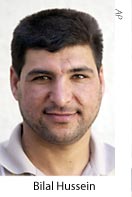New York, September 17, 2006 – The Committee to Protect Journalists is alarmed by news that a Pulitzer Prize-winning freelance photojournalist working for The Associated Press in Iraq has been held by U.S. military forces for five months without charge.
“U.S. authorities who have detained Bilal Hussein in Iraq must either charge him or release him from custody,” said Joel Simon, CPJ executive director. “This is not an isolated incident. In the last 18 months alone, seven Iraqi journalists were detained for periods of many weeks or months before being released. No charges were substantiated in any of these cases. The long-term detention of Hussein is especially troublesome given explicit commitments made by U.S. officials that journalist detentions would be promptly reviewed.”
In March, U.S. military officials in Baghdad and Washington, D.C., outlined a new policy they said would avert the long-term detentions of journalists held without charge. On March 23, Maj. Gen. John Gardner told Reuters in Baghdad that the U.S. military had established a new goal of reviewing cases of detained journalists within 36 hours.
“Once a journalist is detained,” Gardner told Reuters, “it comes to me.” The change, he said, was designed to ensure that “we don’t hold someone for six or eight months.” The next day, on March 24, Pentagon spokesman Bryan Whitman told CPJ in Washington: “The intent is to bring better visibility and quicker attention to the [U.S. military] leadership when a journalist is detained.”
Both officials also said that the military recognized the rights of journalists to independently report news across Iraq. “We obviously do not want to discourage the press from being present,” Gardner told Reuters. “We are aware that journalists, by the nature of their duties, often will be at the scene of attacks when they occur,” Whitman told CPJ.
The U.S. military maintains that Hussein is a suspect for allegedly having close ties to Iraqi insurgents. “He has close relationships with persons known to be responsible for kidnappings, smuggling, improvised explosive (IED) attacks, and other attacks on coalition forces,” according to a May 7 e-mail from Gardner to AP International Editor John Daniszewski, which was quoted by AP. “The information available establishes that he has close relationships with insurgents and is afforded access to insurgent activities outside the normal scope afforded to journalists conducting legitimate activities.”
AP executives and editors decided to make public Hussein’s prolonged detention after they had “worked quietly until now” to press U.S. military authorities for his release. “But with the U.S. military giving no indication it would change its stance, the news cooperative has decided to make public Hussein’s imprisonment,” said Tom Curley, AP’s president and chief executive officer. “We want the rule of law to prevail. He either needs to be charged or released. Indefinite detention is not acceptable.” The AP executive also said: “We’ve come to the conclusion that this is unacceptable under Iraqi law, or Geneva Conventions, or any military procedure.”
Hussein is an Iraqi citizen who began working for the AP in September 2004. AP reported that he had photographed events in Fallujah and Ramadi until he was detained on April 12 this year. One of Hussein’s photos was part of the package of 20 photographs that won a Pulitzer Price for breaking news photography. His contribution was an image of four insurgents in Fallujah firing a mortar and small arms during the U.S.-led offensive in the city in November 2004.
CPJ documented seven cases in 2005 alone in which U.S. forces detained Iraqi journalists for periods of many weeks or months without charge or due process. Six of seven were eventually released without charge. In April, a three-judge panel from Iraq’s Central Criminal Court ordered the release of the seventh, CBS News cameraman Abdul Ameer Younis Hussein, who was held for a year before charges against him were made public. The U.S. military finally accused him of collaborating with insurgents, but an Iraqi court dismissed the charges for lack of evidence.
At present, there is no evidence of any formal charge against Hussein.
